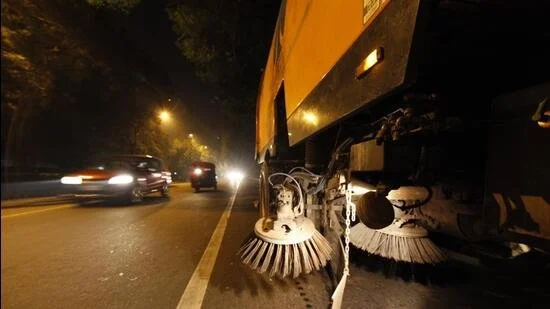Mechanical road sweepers may be deployed on narrower streets
While roadside dust continues to be one of the biggest contributors to Delhi’s air pollution, the city’s mechanical road sweeping (MRS) operations have largely remained confined to arterial roads wider than 60 feet. Now, with the Delhi government initiating the process to procure its own MRS fleet for cleaning its 1,400km network of arterial roads, the Municipal Corporation of Delhi (MCD) is preparing to redeploy its existing machines to smaller inner-colony roads, officials said.
At present, 52 MRS units run by the MCD are deployed on roads wider than 60 feet managed by the Public Works Department (PWD). A senior MCD official, who asked not to be identified, said that since PWD did not have its own mechanical sweepers, MCD’s machines were being used on its network.
“Now that the Delhi government has begun procuring its own MRS units, our machines can be shifted to smaller municipal roads. These will now operate on roads between 45ft and 60ft in width,” the official said. “Much narrower lanes will continue to be cleaned manually.”
Currently, MCD’s fleet of 52 sweepers is supplemented by 14 new units expected under the National Clean Air Programme (NCAP), funded by the central government. Each sweeper covers around 30-35 km of lane length of road per day, and the corporation targets collecting about 150 tonnes of road dust daily. The collected dust is transported to landfill sites in Okhla and Bhalswa, and to the construction and demolition waste plant in Shastri Park.
However, the effectiveness and transparency of MCD’s sweeping operations have been questioned in recent standing committee and House meetings. Several councillors have alleged that dust collection claims are frequently exaggerated by civic officials and that deploying manual sweepers on stretches already serviced by mechanical units led to duplication of work and wastage of resources.
Ashok Bhasin, who heads the North Delhi Residents’ Welfare Federation, said there is a single machine in the north campus which runs from Maurice Nagar to Patel Chest. “The contractors aim to just complete the number of kilometers covered. The work is taking place on paper. The efficiency on roads wider than 60ft should be audited first to expose the corruption. Moreover, the state of roads is so poor that these machines would be ineffective on battered roads. Dug up roads and pending work to lay down pipelines has turned the entire region into a dustbowl,” he said.
An MCD official said that to improve transparency, the movement of MRS units can be tracked live on the corporation’s online portal. “A large number of citizens walk or cycle on smaller roads near their homes, where suspended dust poses direct health risks. Extending mechanical cleaning to these stretches will reduce exposure and improve air quality. Machines can clean the roads every alternate day,” the official said.
Road dust remains one of the largest sources of particulate pollution in the Capital. A 2018 source apportionment study by The Energy and Resources Institute (TERI) found that dust contributes up to 25% of Delhi’s overall air pollution, mainly through elevated PM10 levels. The study attributed much of this to potholes, unpaved stretches, and broken pavements, which constantly release dust into the air.
PM10 particles, though heavier and unable to travel long distances, are particularly harmful to human lungs, leading to chronic respiratory illnesses.
Experts said the expansion of mechanical sweeping to smaller roads could play a vital role in mitigating localised dust levels ahead of the winter pollution season.
“Mechanical road sweepers are very effective in reducing fugitive dust emissions on roads if used properly. While we add new sweepers, it is also important that the rods are pothole-free and are not left unpaved or dugged; otherwise, the sweeping won’t result in any reduction in dust emissions, as the sources of dust will still be adding more loose soil to the roads,” Sunil Dahiya, founder and lead analyst at the think-tank Envirocatalysts, said.
“Transparent public sharing of data on the schedule of cleaning of roads by these mechanical sweepers on different stretches and their GPS tag data will enhance accountability and efficiency.”

